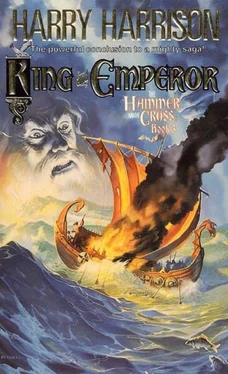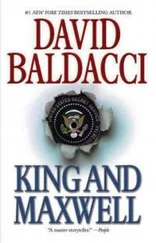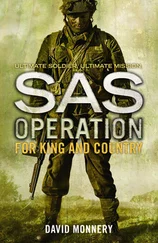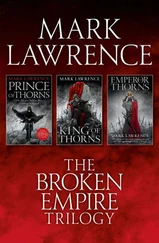Shef pondered for a while as the double translation wandered on, the Arabic of Ghaniya heard and put into a kind of Latin by Suleiman the Jew; the Latin heard and put into the Norse-English dialect of Shef's court by Boniface. Eventually he raised a hand. The translation stopped at once.
“Tell him, Boniface, that I am told they do not consider us to be People of the Book. Now, Thorvin, show him one of our books. Show him your book of holy poems, written all in runes. Boniface, ask whether he will not say that we too are people of a book.”
Ghaniya stroked his beard as the big man in white with a hammer in his belt came towards him, holding out a volume of some kind. He let Suleiman take it in case there was some sort of defilement lurking in it.
“What is it made of?” he muttered in Arabic.
“They say it is the skin of calves.”
“Not pigs, then, praise Allah. They have no paper, then?”
“No. Neither paper nor scrolls.”
Both men looked at the writing without comprehension. Suleiman peered closer.
“See, lord, there are no curves anywhere in this script. It is all straight lines. I think they have taken some system they have for scratching marks on wood with a knife, and made it into a kind of writing.”
Shef's one sharp eye saw the very faint curl of contempt on Ghaniya's lip, and remarked to the men behind him, “They are not impressed. See, the spokesman will praise it politely and not answer our question.”
“The emissary of the Caliph sees your book,” tried Suleiman manfully, “and admires your penmanship. If you have no artisans skilled in the making of paper, he will send instruction. We too did not understand that art till it was shown to us by captives from a far Empire, whom we defeated in battle many years ago.”
Suleiman found no Latin word for “paper” other than papyrium , papyrus, known to Boniface already, though he used “vellum?” By the time translation reached Shef it had become “calf-hide,” neither new nor interesting.
“Accept his offer politely and ask what brings him here.”
All the advisers, English and Norse, Christians and Way-men alike, listened attentively as the story rolled out, of attacks on one island after another, of the Greek fleet and the Frankish soldiers, of the iron men and the Greek fire. As Suleiman reached the last point, Shef intervened again to ask if there was anyone in the embassy who had seen it for himself. Their group parted and a young man was urged forward: a young man with the dark aquiline face of his leader, but on it, Shef could only say, an expression of smug superiority he was not diplomat enough to conceal.
Slowly the young man was led through his tale.
“You have sharp eyes,” said Shef at the end.
Mu'atiyah looked sideways at Ghaniya, received a nod, and slowly produced his spyglass.
“My master, bin-Firnas,” he said, “is the wisest man in the world. First he learned to correct the weakness of his eyes, by the use of a reading-glass of the correct shape. Then one day, by his direction and the will of Allah, I discovered that two glasses will make the far-off close.” He trained the stout leather-covered lens out of the open window, seemed as always to have difficulty finding the right focus.
“There,” he said finally, “an unveiled maiden bends over the well, winding up water in a bucket. She is of great beauty, fit for a caliph's harem, and her arms are bare. Round her neck she wears—she wears a silver phallus, by Allah!” The young man's laugh brought a frown of disapproval from his own leader: wiser not to mock the savages, even if their women had no shame.
Shef looked at Ghaniya, received the nod of permission, took the strange object from the young man's hands, ignoring his frown of discontent. He looked at the larger end, took a cloth from a table and rubbed the lens gently, feeling its shape. Did the same at the smaller end. He had noticed before, looking through the thick bottle-glass which was the best his own world could produce for windows and that only for the greatest, how shapes were distorted by it. So that could be useful as well as a hindrance.
“Ask him why one end has to be smaller than the other.”
A mutter of translation. The answer: he does not know.
“The shape at the large end bulges out. What would happen if it curved in?”
Again the mutter, again the answer.
“What happens if the tube is longer or shorter?”
This time the answer was evidently angry, the Jew's translation shorter, as if diplomatically altered. “He says it is enough that it works,” came the filtered reply from Boniface.
Finally Shef put the tube to his one eye, looked where the young Arab had. “Yes,” he remarked. “It is Alfwyn daughter of Edgar the groom.” He inverted the tube, looked through the large end as Ma'mun had done before him, to a grunt of impatience from the Arab, handed it back without further comment.
“Well,” he said, “they know some things, but they seem to have no great desire to learn any more. People of the Book, indeed, doing things because their master said so. You know what I think of that, Thorvin.” Shef looked round at his advisers, aware that nothing he said could be understood by Suleiman or the others without further translation into Latin. “Is there any good reason why we should ally with them? It seems to me they need us more than we need them.”
The demonstration had gone wrong, Ghaniya realized. He had thought little of their book. They had noticed—or their king had—that Mu'atiyah was a fool, for all the wisdom of his master. This was a moment when his mission hung in the balance. His voice hissed ominously as he whispered to Mu'atiyah and Suleiman together.
“Tell them of the glories of Cordova, you fools. Mu'atiyah, tell that king of theirs something about your master that even he will wonder at. And no tricks for children! He may be a savage, but he is not one to be deceived by toys!”
Both men hesitated. Suleiman was the quicker to respond. “You are a Christian priest?” he said to Boniface. “Yet you serve a king who is not of your faith? Tell your master, then, that so do I. Tell him that it would be wise for all those of us who serve masters like him and like my master to stand together. For whether we are all People of the Book or not—and I do not think his book is like my Torah or your Bible or my master's Koran—yet we are all people of the blessing. Our blessing is that we do not seek to make others share our belief by force. The Greeks burn or blind those who do not share their creed down to the last word and glossing. The Franks say to each other, ‘Christians are right and pagans are wrong.’ They accept no other book than their own Bible and their own reading of it. For your sake and mine, father, add your own words to what I have said, I beg you! We are the ones who will suffer first. They call me the crucifier of their Lord. What will they call you? A traitor to the Faith?”
Shef listened as Boniface, paraphrasing now rather than translating, repeated the substance of Suleiman's appeal. He noted the concern on the Jew's face. His own betrayed no response.
“Ask what the other has to say?”
Mu'atiyah had time to collect his thoughts, but they ran only to a repetition of the many virtues of his master: virtues in the Arab tradition. He had made a machine for counting out the beat of music, so that musicians might play their instruments in time. His courtyard was the glory of Cordova for the glass roof he had made over his fountain. He had found out how to make glass from ashes. His poetry—Mu'atiyah was grasping at straws by now—was famous across the world.
Shef glanced round at his advisers, ready to draw the audience to a close. Ghaniya scowled furiously at the gabbling Mu'atiyah, now shaken by the lack of interest on all faces.
Читать дальше











